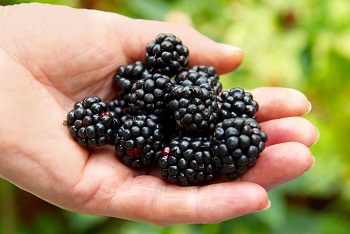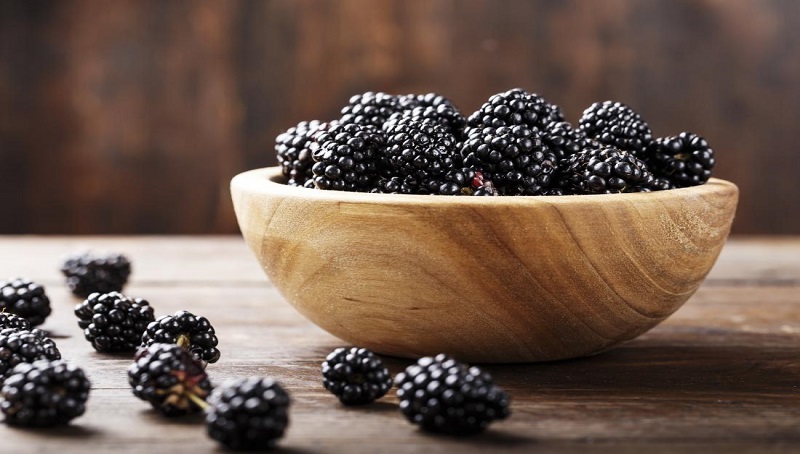Most recipes you will stumble upon will either can for blackberries in ounces (so by weight) or in cups (so by volume), but what do these actually mean in the end? How many blackberries will you actually find in a pound or a cup? As we did for so many products before, we took it into our own hands to find the answer to this question and figure out exactly how many blackberries you will have to buy for different recipes.
We went straight to the store and browsed the fruit section and went ahead to do our own experiments to figure out how many blackberries are in each cup. To test the number of blackberries that fit in a cup we picked out 1 pound of average blackberries. Generally, you will find that berries are around 3cm or 1.2 inches long.
We figured out that there are around 50 berries in a pound, which could fit in about 3.12 cups. This translates into each cup weighing about 5.12 ounces and containing about 16 blackberries, depending on their size. Blackberries are usually found in plastic clamshell containers of about 1 pint each, and each container will hold about 32 berries.
A cool piece of info that not a lot of people know is that blackberries are a not very distant relative of the rose. They also have thorns that will cover the plants and are considered a bramble crop. Blackberries are known to have a lot of health benefits. They have so many known benefits that English children were dismissed from school to pick berries during World War I. It is said to have helped soldiers during world wars, being made into juice and sent on the battlefield to give people strength for fighting.
The information we shared above should be enough for you to know exactly how many blackberries you need when a recipe calls for a certain number of cups. If you still feel like you need help converting different measurements of blackberries, then you can always use the custom conversion tool you will find below.
You might also like our articles about the weight of blueberries, grapes, or lemons.
Custom Conversions for Pound of Blackberries
Blackberry Nutritional Values
Each cup of blackberries will weigh about 154 g according to the USDA and contains about 0.7 grams of fat, 13.8 grams of carbohydrates, 2 grams of protein, and 62 calories. Blackberries also provide considerable amounts of manganese, fiber, and vitamin C. Here’s a summary:
- Protein: 2 g
- Sugars: 7 g
- Fiber: 7.6 g
- Carbohydrates: 13.8 g
- Sodium: 1 mg
- Fat: 0.7 g
- Calories: 62
Vitamins and Minerals
 You will get half of all the recommended intake of vitamin C and mineral manganese in a single serving of blackberries. Amazing, right? These two nutrients are great antioxidants that are very potent in reducing the oxidative stress on the cells, by helping the body get rid of free radicals. This is done easily by breaking the link between free radicals and different molecules that usually damage the cells and destabilize them.
You will get half of all the recommended intake of vitamin C and mineral manganese in a single serving of blackberries. Amazing, right? These two nutrients are great antioxidants that are very potent in reducing the oxidative stress on the cells, by helping the body get rid of free radicals. This is done easily by breaking the link between free radicals and different molecules that usually damage the cells and destabilize them.
Blackberries also contain other nutrients, like a high level of vitamin K, calcium, iron, vitamin A, magnesium, and potassium.
Protein
Blackberries aren’t known to provide huge amounts of protein. People will usually combine blueberries with oatmeal (6 grams for every cup after cooking) or Greek yogurt (17 grams per 170-gram serving) for an additional boost of protein.
Fat
Blackberries have almost no fats in them. The very few fats that can be found in blackberries are actually considered healthy, will improve heart health, and reduce vascular inflammation. These are polyunsaturated and monounsaturated types of fats.
Carbs
Out of the 13.8 grams of carbohydrates that you would find in a cup of blackberries, around half will be pure fiber. Blackberries contain a combination of simple carbohydrates (namely sucrose, glucose, or fructose) and complex carbohydrates that have a smaller impact on your blood sugar because they are metabolized at a slower rate. This takes the glycemic index (GI) of blackberries to only 25, which is also great.
What is even more impressive is that each serving of blackberries is said to give you one-third of your daily recommended fiber intake. Some types of fiber are soluble, which helps your digestion and will slow any absorption of fat and sugar into your blood, while others are insoluble, which helps you keep your stool regular.
